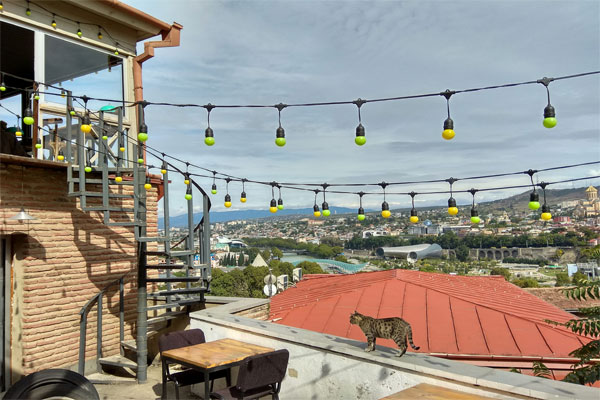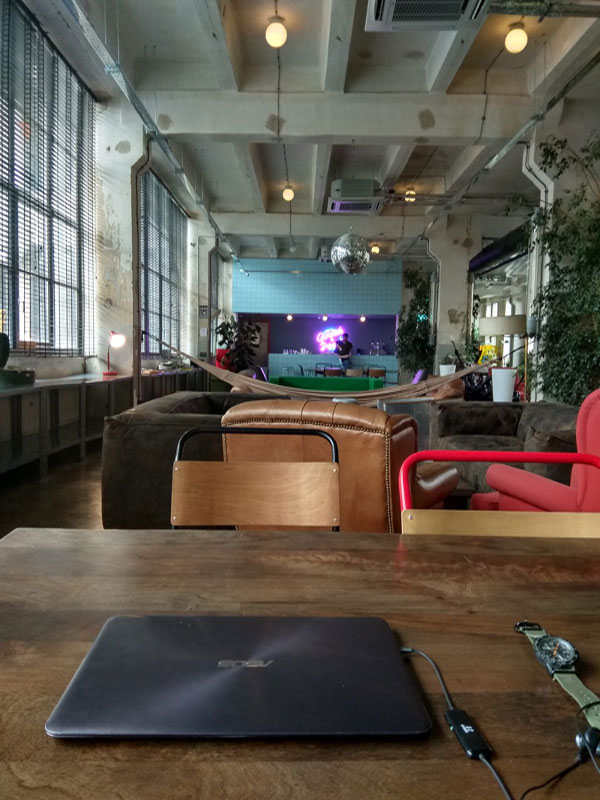View From Beyond the Cubicle: Matt Zbrog in Eastern Europe
Living and working abroad upends the usual order of things. New perspectives, new surroundings, and new possibilities present themselves on a daily basis. While all that can be found in the U.S., the dosage is amplified when living in a far-flung place. I crave a little strange. I enjoy a recurring sense of slight confusement. Living abroad will challenge all your assumptions and rebuild your worldview. That’s not for everyone, but at this point I couldn’t live without it.
Situated between Russia, Iran, and Turkey, the Western-leaning country of Georgia could be called the hip part of a rough neighborhood. Beaches, mountains, deserts, forests, wine, and a temperate climate—this was once known as the California of the USSR. While the capital, Tbilisi, often acts as a jump-off point for tourists to take excursions into the Caucasus Mountains in the north or the wine regions in the east, the city is a destination in itself, with a vibrant food and wine culture, a diverse demography, and one of the best club scenes in the world. Few places on Earth can boast so much in such a relatively small space.
This is a place that has a credible claim to inventing wine 8,000 years ago (and, if you visit, you will be reminded of that fact many, many times). This is a place that regularly practices the art of the feast. It’s tempting to replace the California comparison with this one: Georgia is the Italy of Eastern Europe, with all the flamboyance and passion and food and wine and chaos that goes with it. But the comparisons will always fall short because there’s no other place quite like this.
This is Georgia. This is the far frontier of Europe. While tourism, and prices, are increasing, they haven’t caught up to reality yet making this an ideal location for digital nomads breaking free from the cubicle and looking for a new desk.
As an American, my passport gives me easy access to a lot of the world – but rarely for more than 90 days at a time. But Georgia, in the interests of boosting both tourism and development, offers a 365 day visa on arrival for citizens of several countries, and that visa is renewable any time one leaves and re-enters the country, with no waiting period necessary. After working in Hungary, Serbia, Kosovo, Turkey, and Ukraine, I was ready to unpack my bags for a while. I’d already been eating Georgian food every other day while living in Kyiv (Kiev). Everyone I talked to said Georgia was an absolute jewel. So I moved to Tbilisi a year ago, and I’ll be here for a while still.
Life in Tbilisi

Famous for its hospitality, Georgia is a remarkably easy country to live in. It’s one of the safest countries in the world. According to the World Bank, it’s one of the easiest places to do business. Most Georgians in Tbilisi speak three languages—Georgian, Russian, and English—and communication is rarely an issue.
The challenges to living in Tbilisi, as an expat, are few, but real.
Challenge number one is the summer heat. It will get up over 100 degrees, and there’s a vicious humidity. Think Mississippi. July is a good time to run to the mountains, or the beach, or hop on a cheap flight or train to explore of the nearby countries.
Challenge number two is the sense of personal space. Veteran travelers will understand this: different cultures have different understandings of space and priority, and it took a few months for me to adjust and get used to being cut in front of in line at the supermarket, for example.
Challenge number three is traffic. Tbilisi is full of cars, and the drivers are absolute maniacs. But they’re talented maniacs. I’ve learned to let go and enjoy the ride.
There are other gripes, to be sure. How many do you have, where you live? But there are also innumerable small benefits to compensate. And if I’m ever feeling a bit alienated or homesick, there’s a large and diverse expat community (NGO workers, journalists, diplomats, students, consultants, restaurateurs) to discuss it with.
Working Remotely from Georgia
Living and working abroad upends the usual order of things. New perspectives, new surroundings, and new possibilities present themselves on a daily basis. While all that can be found in the U.S., the dosage is amplified when living in a far-flung place. I crave a little strange. I enjoy a recurring sense of slight confusement. Living abroad will challenge all your assumptions and rebuild your worldview. That’s not for everyone, but at this point I couldn’t live without it.
Another important factor: if you’re doing this right, your money is going to go further than it would at home. Earning dollars in a country with a low cost of living immediately bumps you up an entire social class and significantly boosts your savings account at the same time. Working abroad allows me to save for the future as well as make time for my own creative pursuits, and it lets me do so in the most comfortable settings that a city can provide.
The biggest challenge of telecommuting is managing your own schedule. You have to consider time zone differences. You have to juggle deadlines that don’t care about what day of the week it is or how long something takes to complete. You have to make time for a social life, and a which takes its own bit of figuring out when you live in a foreign place like Georgia.
A typical day for me looks like this: I’ll get up and make some breakfast and drink a cup of coffee on my patio. I’ll pack my laptop, notebook, book, and pens all into a backpack and head out into the city. I’ll either take the metro to a sweet coworking spot, or I’ll walk down to my favorite courtyard restaurant, or I’ll just stroll through Old Town and look for a desk that I wouldn’t mind sitting and working at. Even after relocating to Georgia, I’m still looking to relocate further by changing up my desks every other day.

After work I’ll often meet up with friends at one of the local pubs or cafes. I’ll practice my Russian or discuss art and current events. Evenings are spent eating out or cooking, or just sitting on my patio with friends or my journal or a good book. It’s a solid routine that costs me a lot less than it does to live in the American suburbs.
Within that structure, there’s a lot of variety. Every month or so I try and take a working vacation to the mountains, or to the beach, or even to new countries that are suddenly within close reach—Belarus, Armenia, Azerbaijan, Kazakhstan, Kyrgyzstan—just to widen my mental map a little further and get a fresh dose of new.
There’s plenty of new right here in Georgia, of course. Even after a year, surprises lie around every corner. In May, police raided major Tbilisi nightclubs with excessive force. More than just a top destination for Europe’s best DJs, those nightclubs acted as safe haven for LGBTQ people and other persecuted minorities. While in other countries these raids might have been met with op-eds in newspapers and strongly worded Facebook posts, in Tbilisi, the response was a several-thousand-person-protest-slash-rave on the steps of parliament.
One of the most inspiring things about living in a place like Georgia is that anything seems possible. Georgians are an ancient people, but their country, in its contemporary iteration, is only 26 years removed from the Soviet Union. The concrete hasn’t dried on anything; there are still plenty of worthy battles to be fought. Groups like the White Noise Movement would be progressive in any country in the world, and in Georgia, they have a loud enough voice to make a real difference.
If you want to telecommute from a place like Georgia, you should enjoy a bit of culture shock. You should be open to new perspectives and personalities. Get out and meet people; oddly enough, it’s never easier to make friends than when you’re far away. There’s nothing strange here about approaching a perfect stranger with a polite greeting. And you’ll find that being removed from your usual context will amplify your personal sense of identity—something which can get lost in a more homogenous and solidified country.
Underneath those less tangible things, you should have a strong quantitative logic undergirding everything. Build and rebuild your schedule, even when you think it’s optimal. Set a budget, record your expenses, find a way to improve. Define a list of priorities and tinker with the ordering. When working and living abroad, you’re in charge of a lot more than usual, and you’re flying on manual controls, so beware of the autopilot.
Although the hip cafes and trendy restaurants and overriding Georgian hospitality can lull you into a feeling of familiarity, it’s important to remember that you’re still a guest in a foreign country. I sound like a parent when I say that, but it’s absolutely true. You should come to a foreign place to learn from it, and that means abiding some quirks and even biting your tongue on occasion. The latter, in particular, can be difficult for those of us who are American.
If there’s one ultimate piece of advice I could give to potential telecommuters, it’s this: take the first step and get out there. Test drive a new setting. Maybe you start in Hungary or Czechia. Maybe you explore the Balkans or the Mediterranean. It could be Asia. It could be South America. Wherever it is, it probably won’t be your final destination, literally or figuratively. Because going mobile isn’t just a liberation from the desk; it’s a revolution of the self through exposure to a myriad of new perspectives and possibilities. It’s the future.


